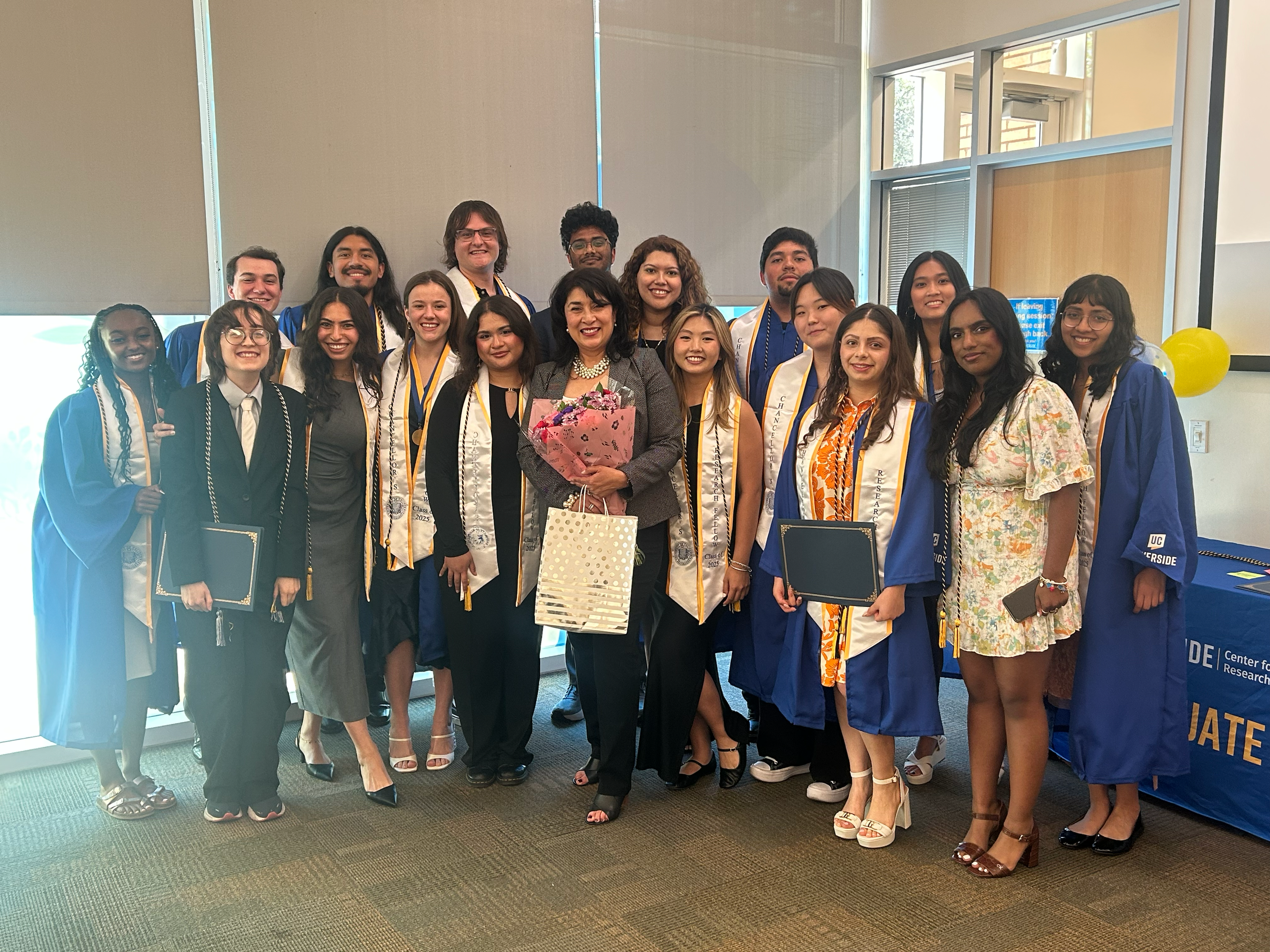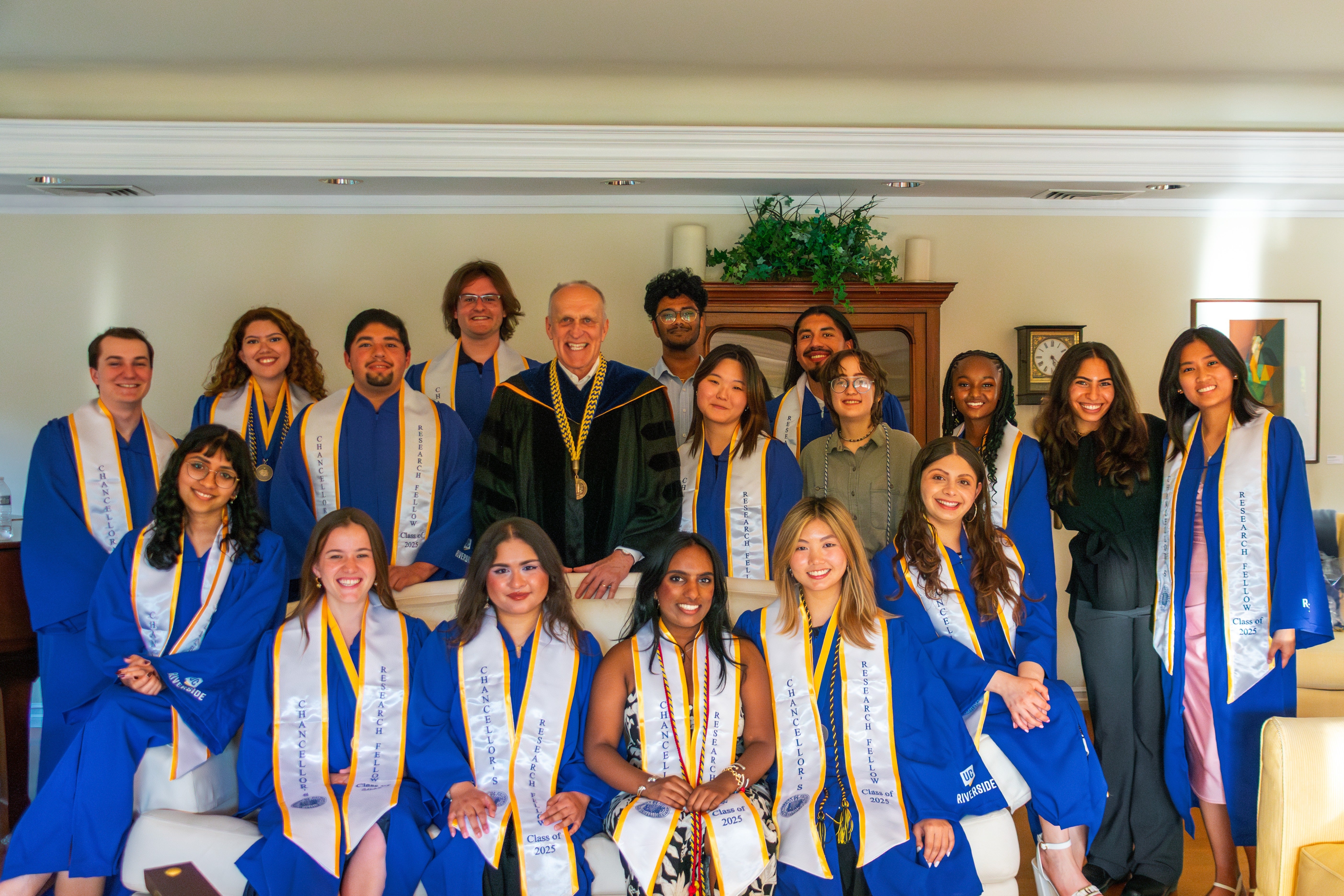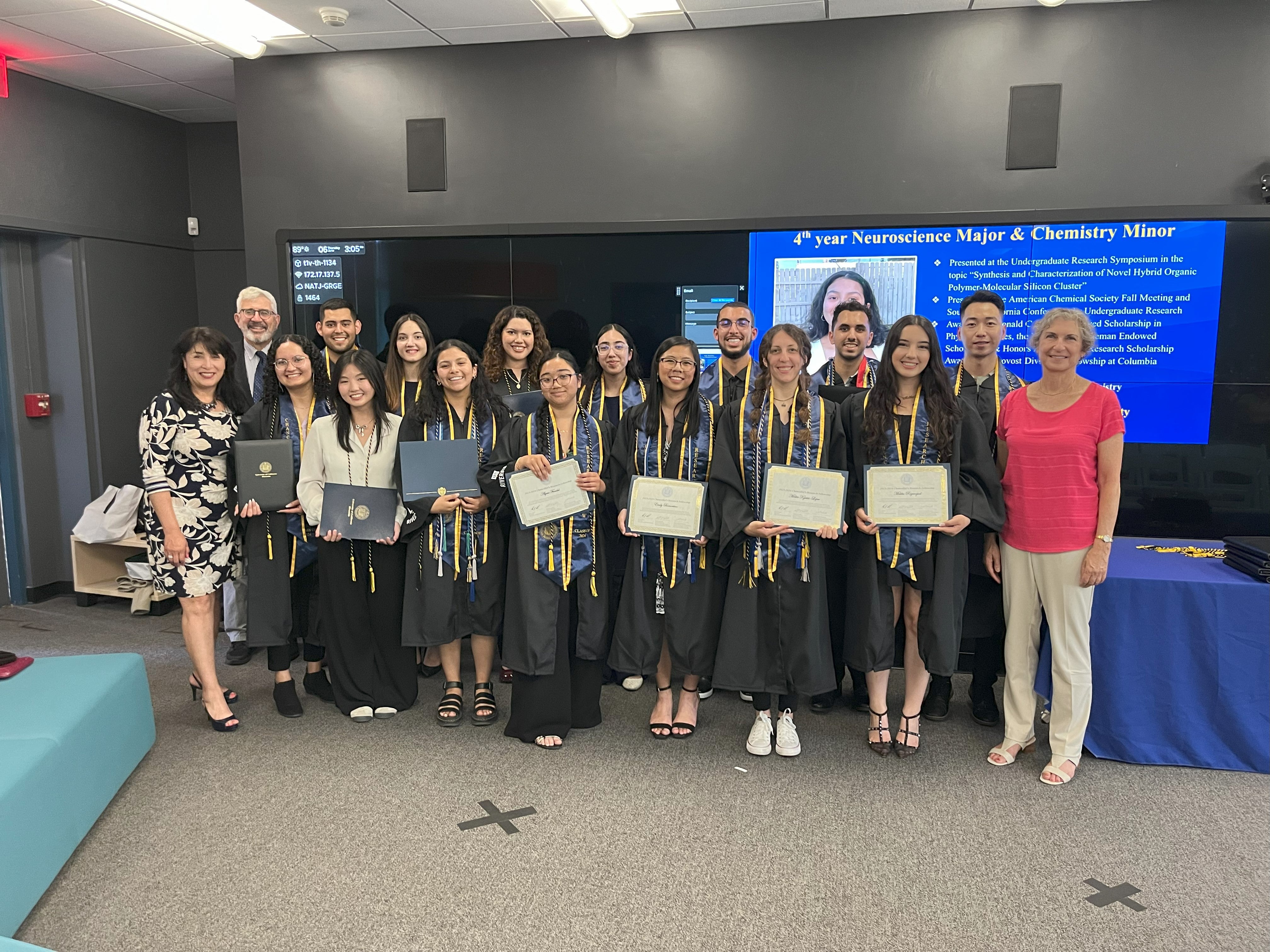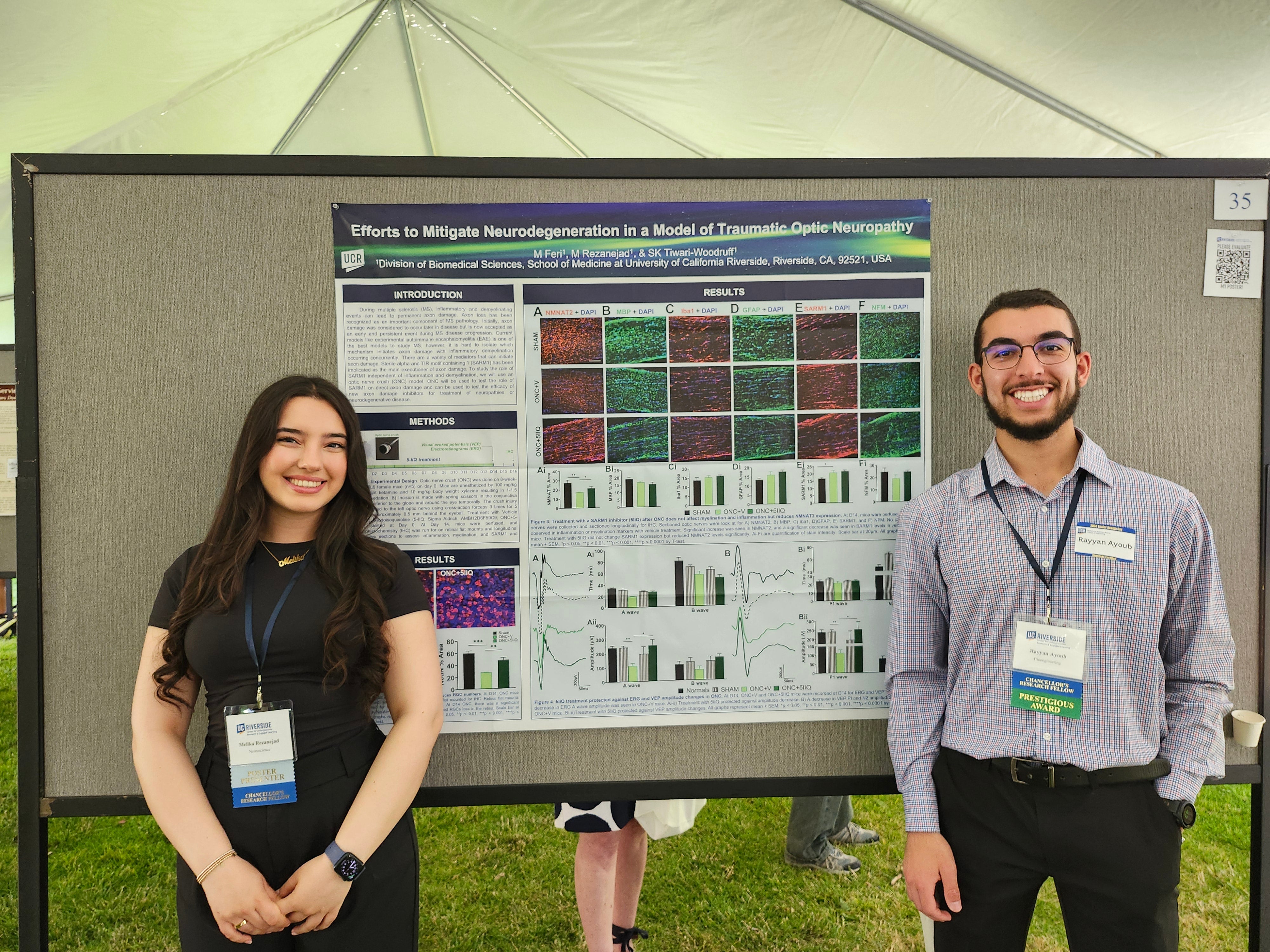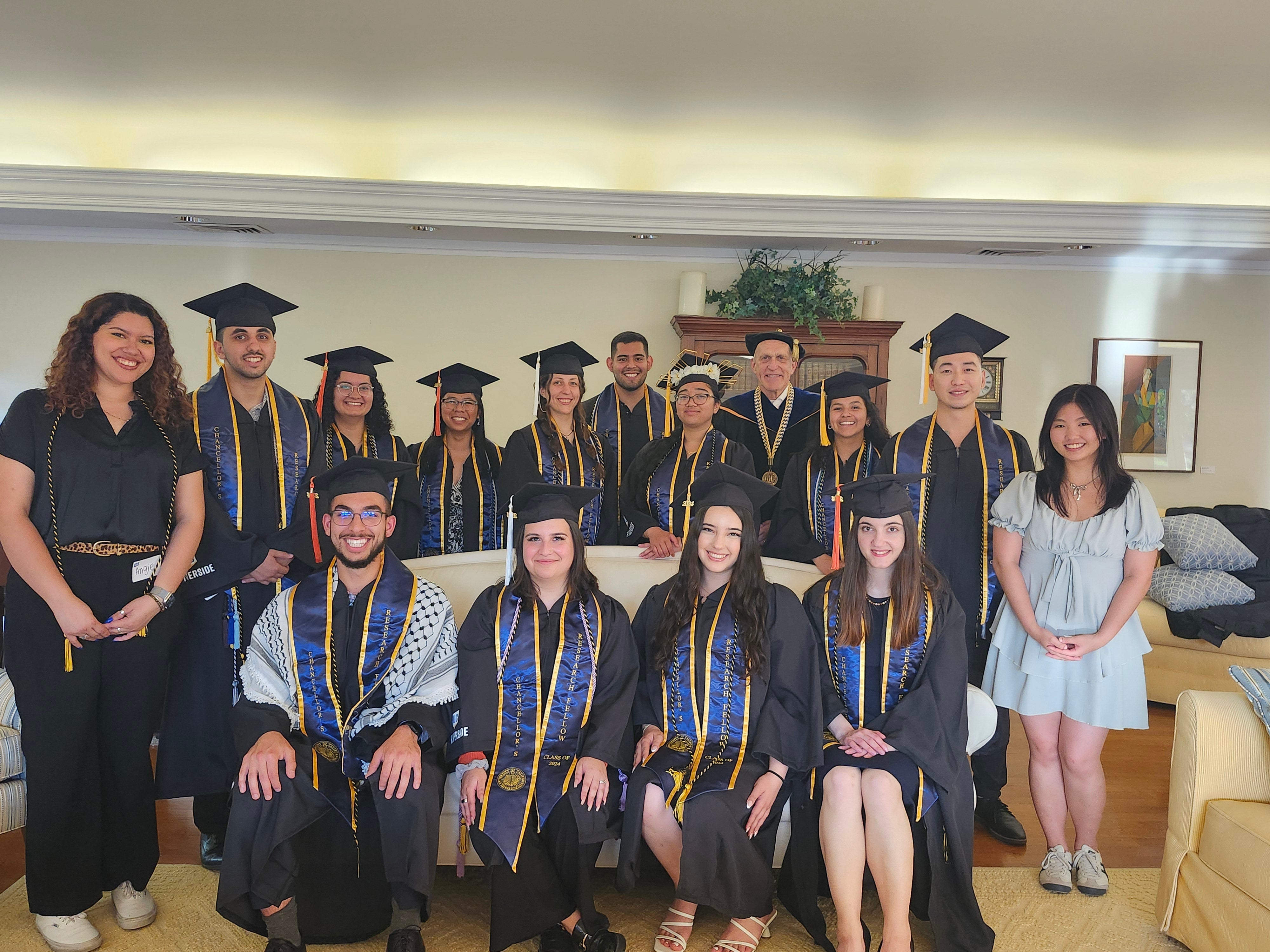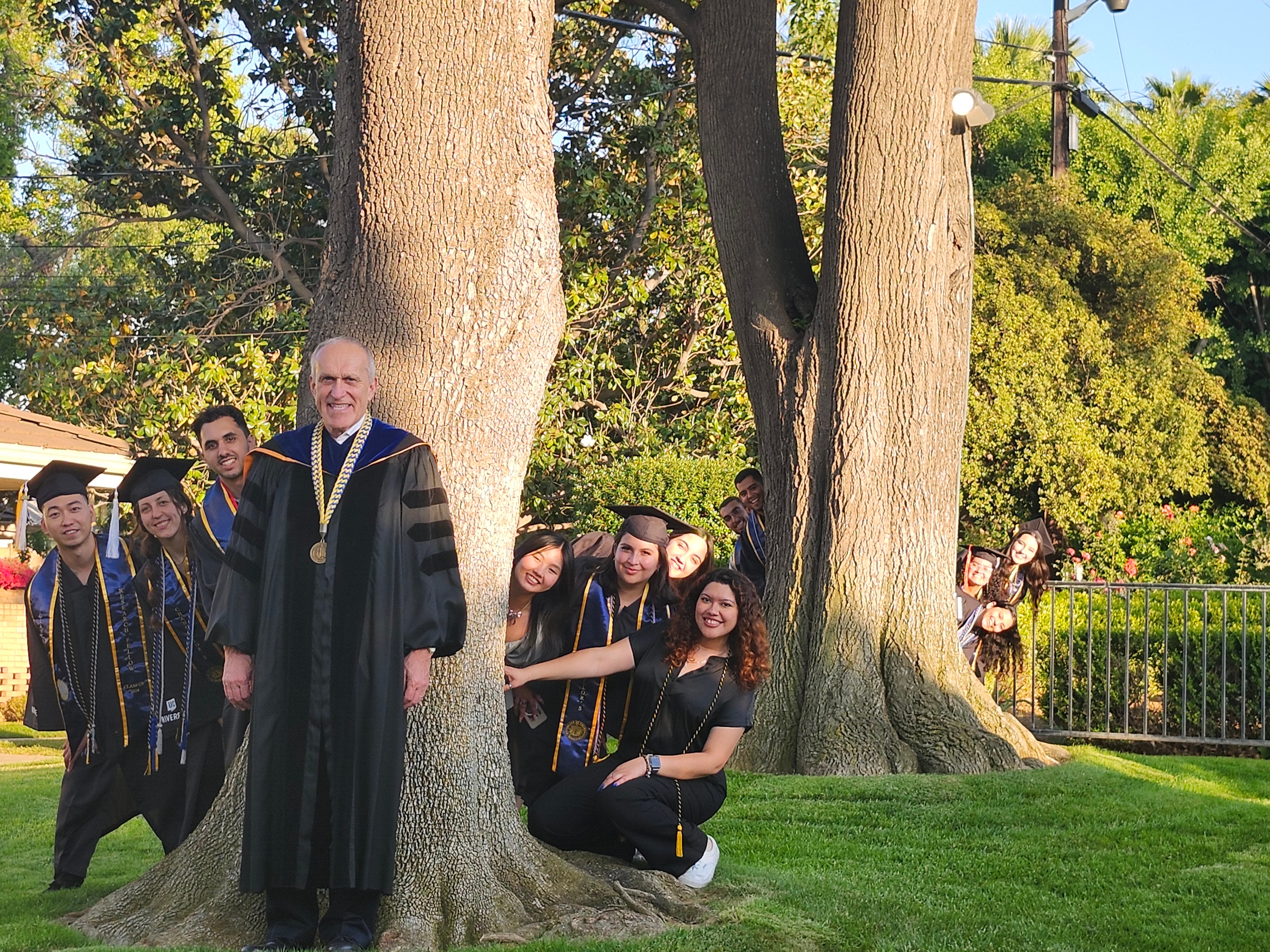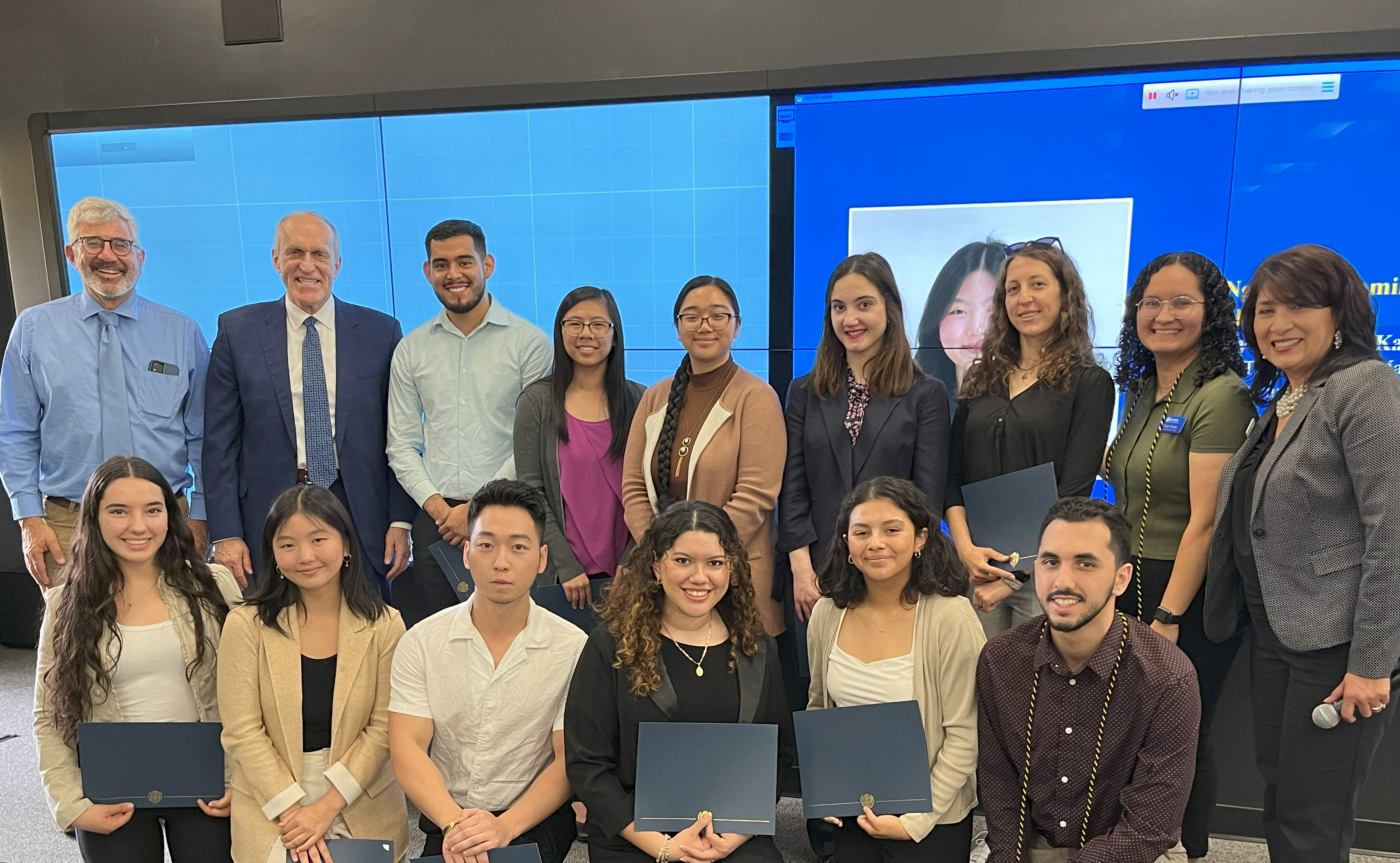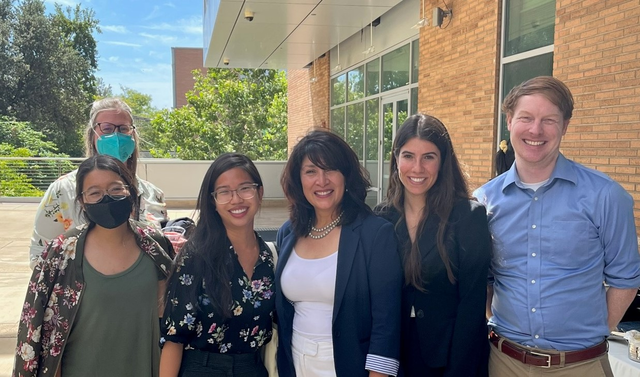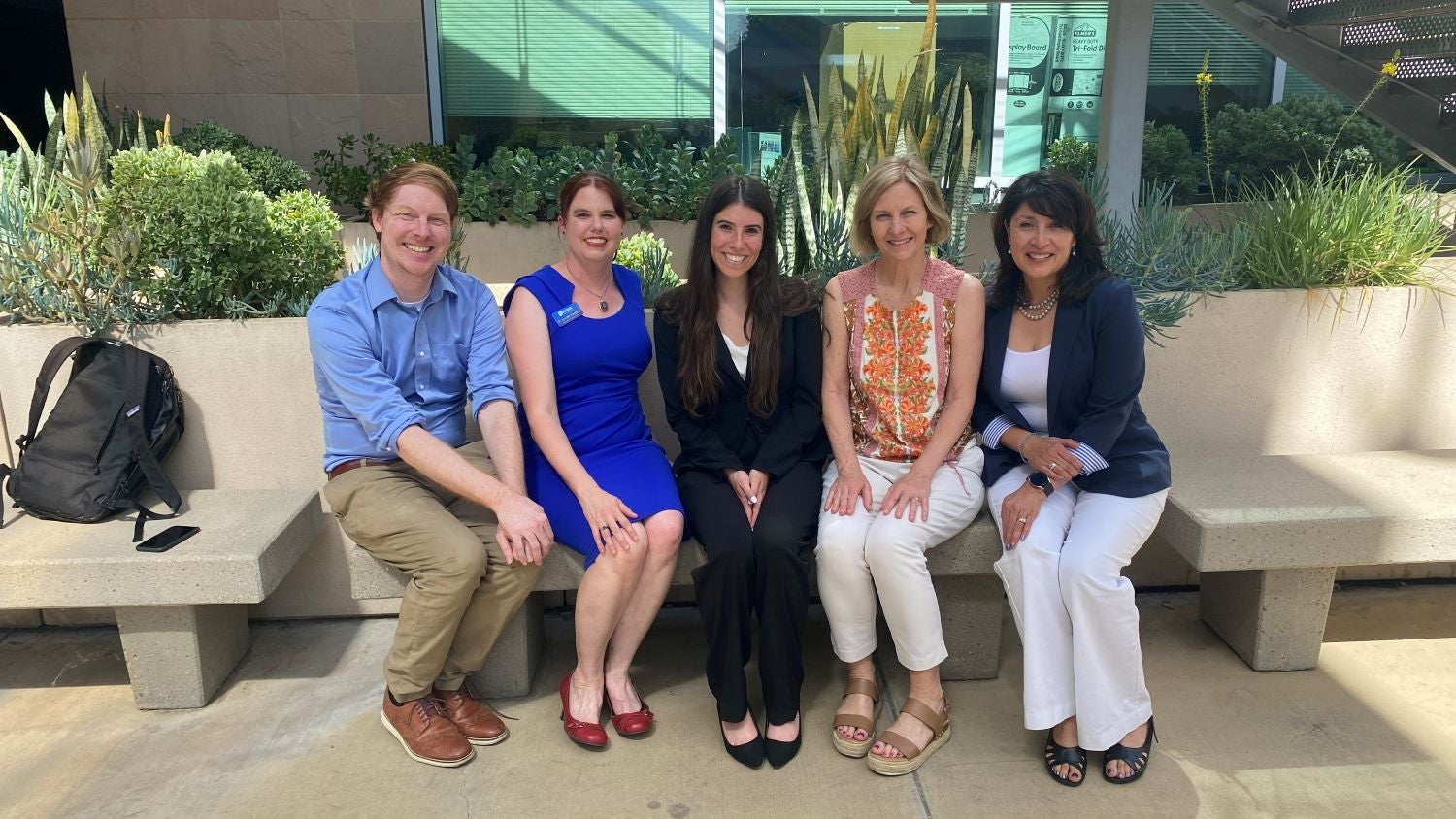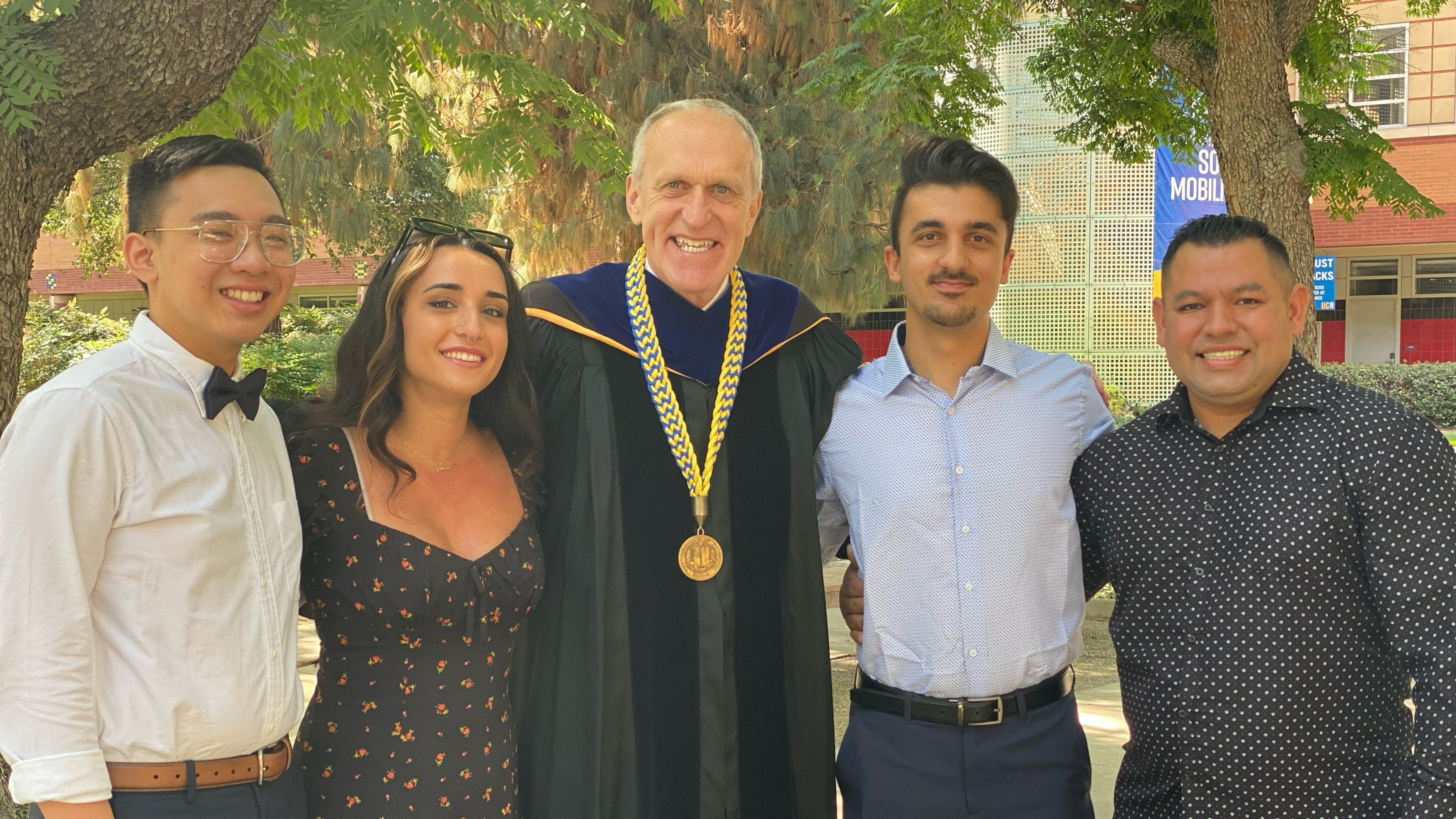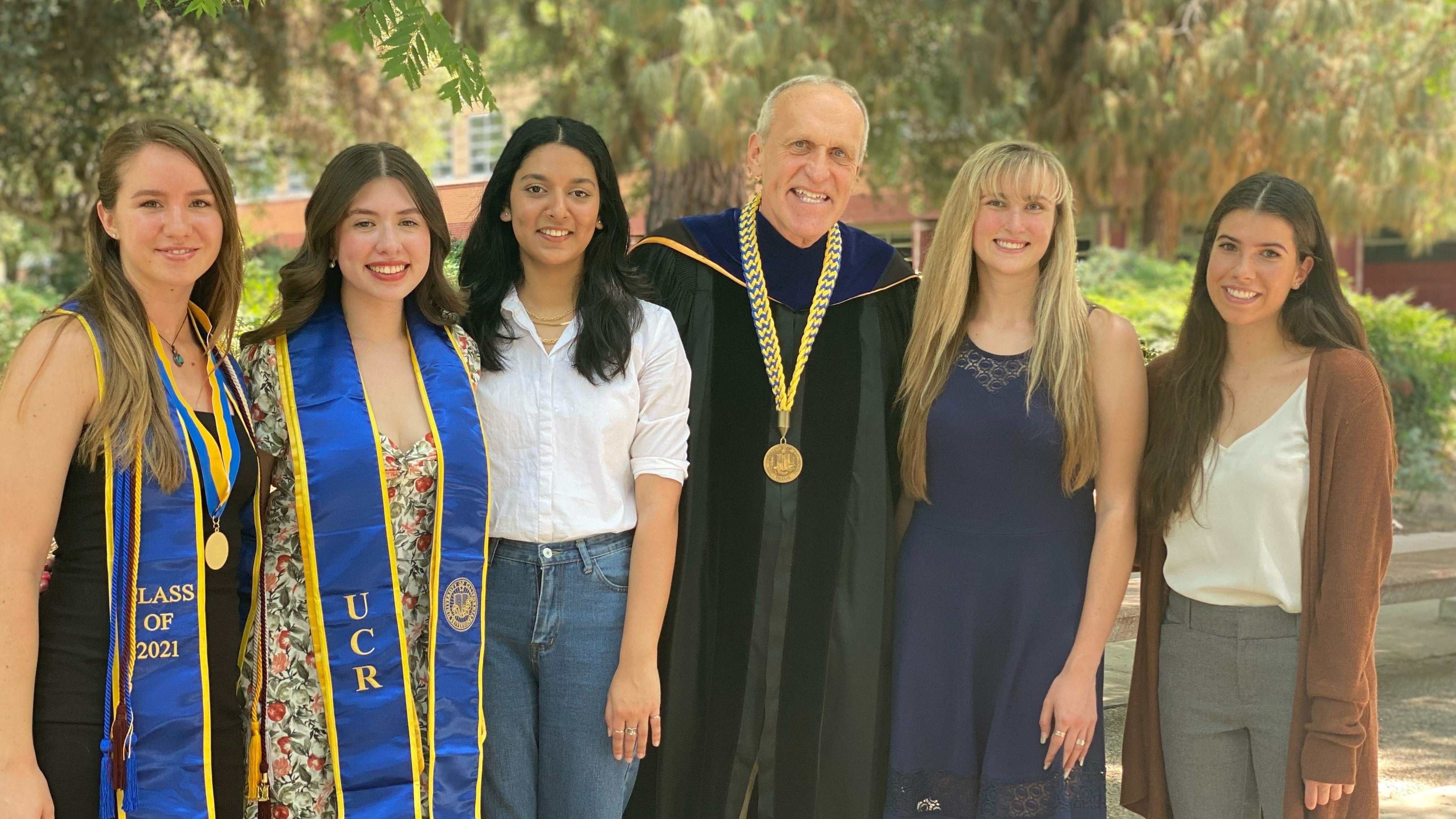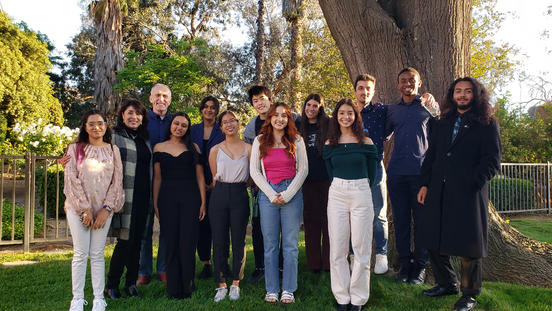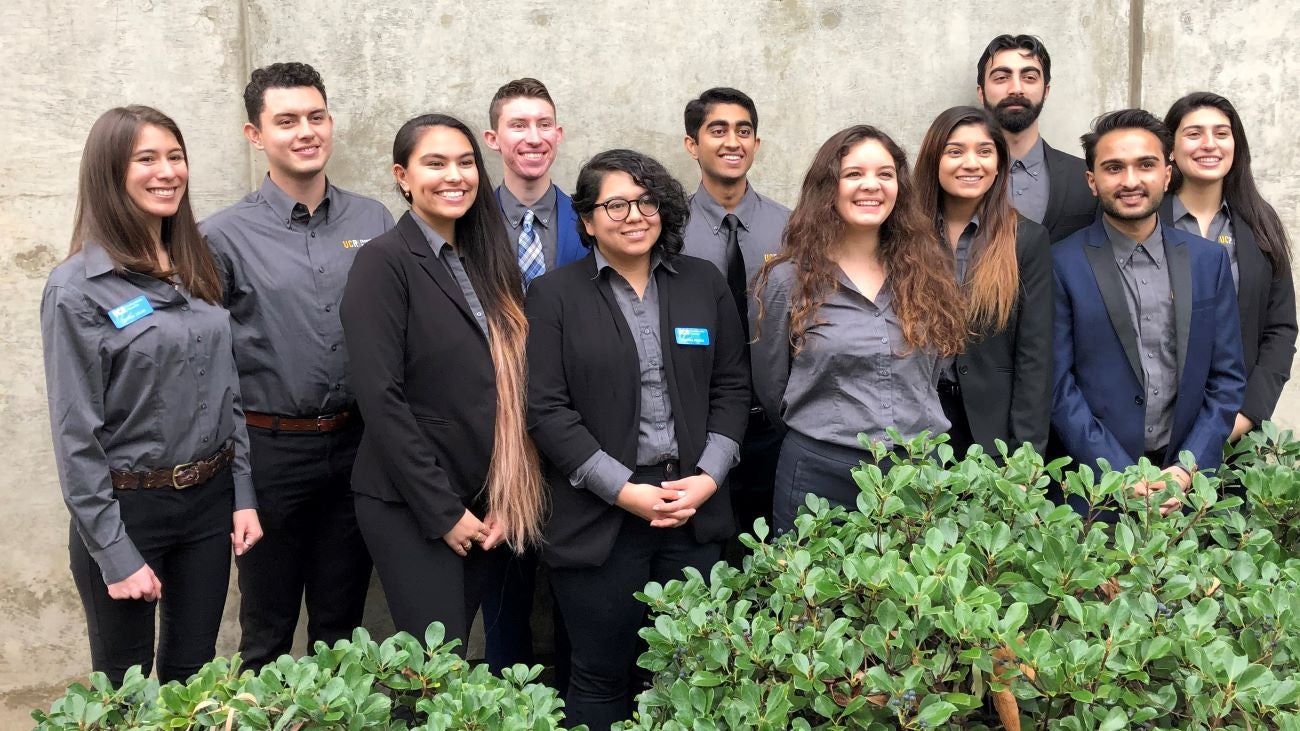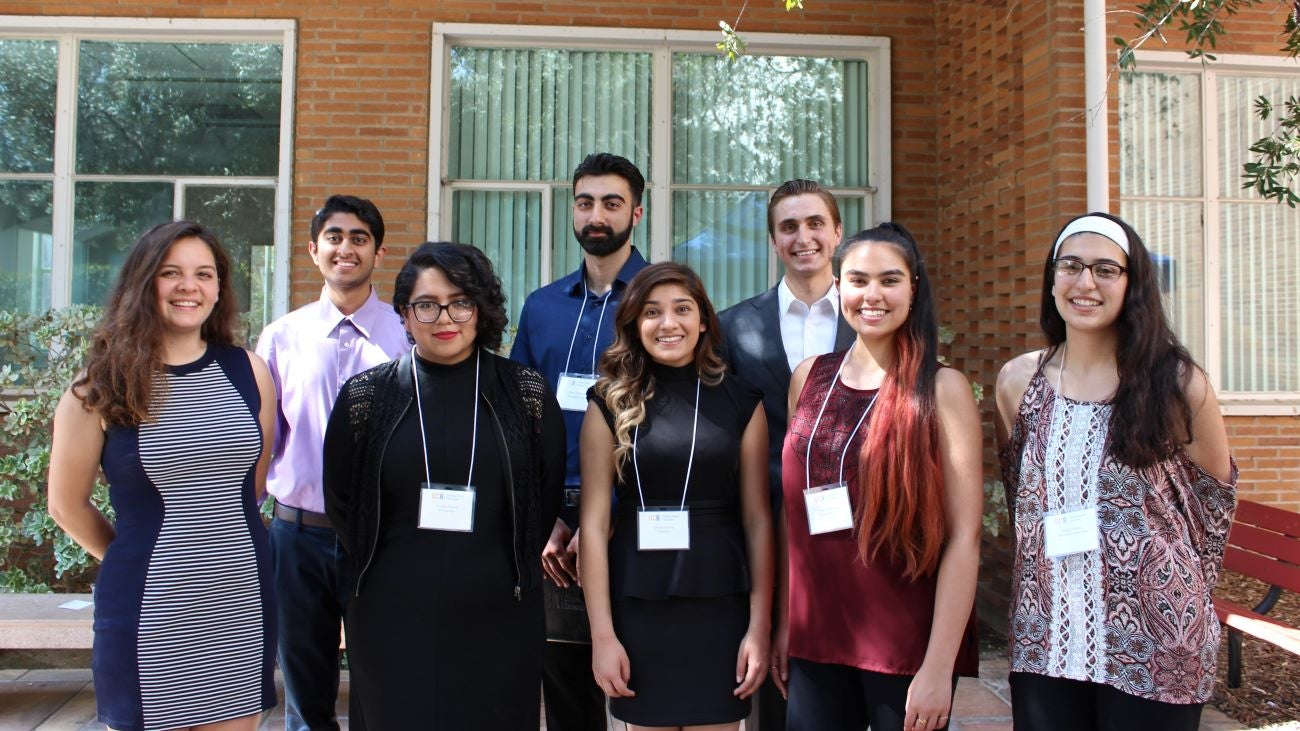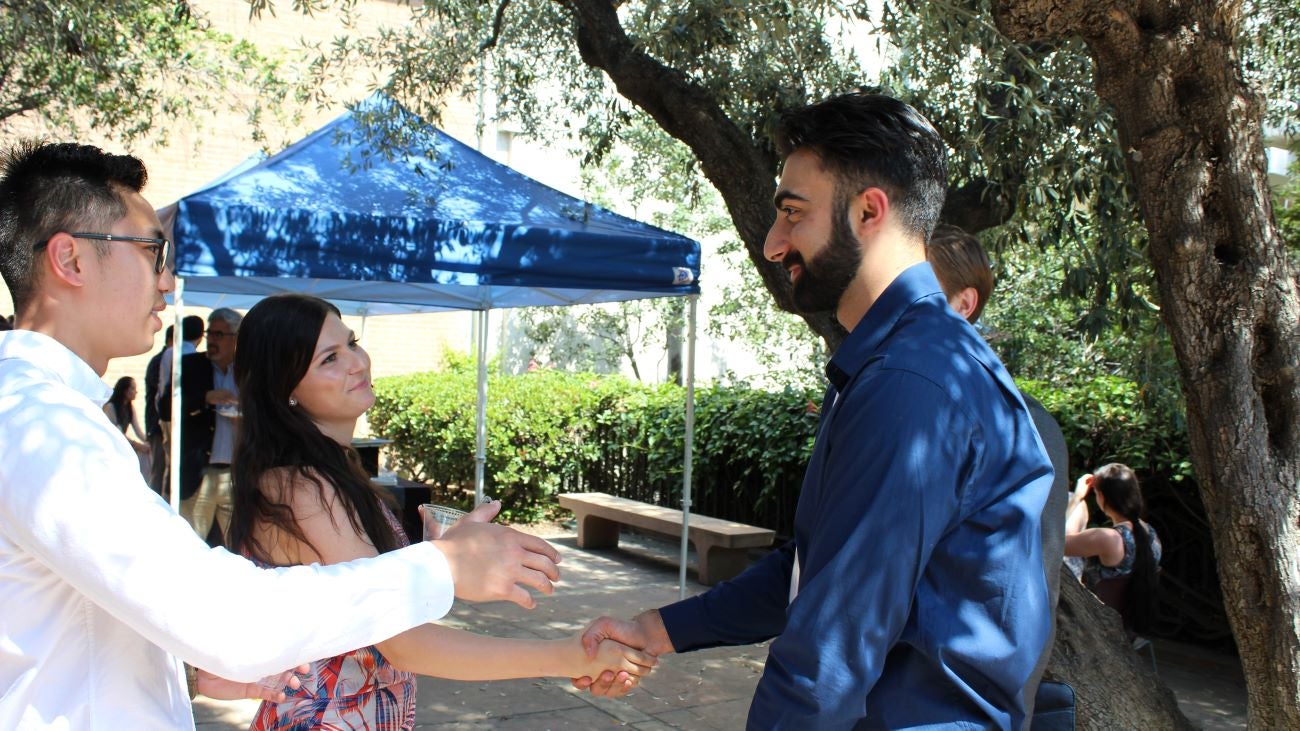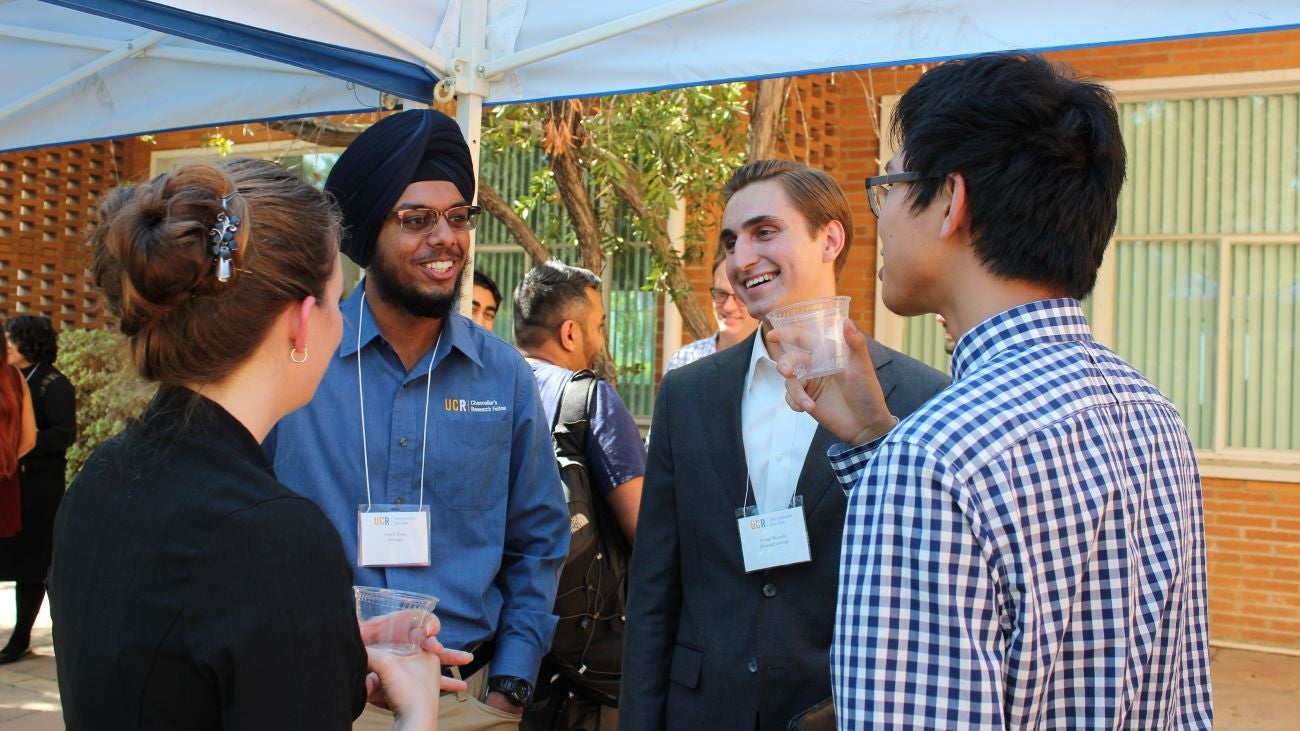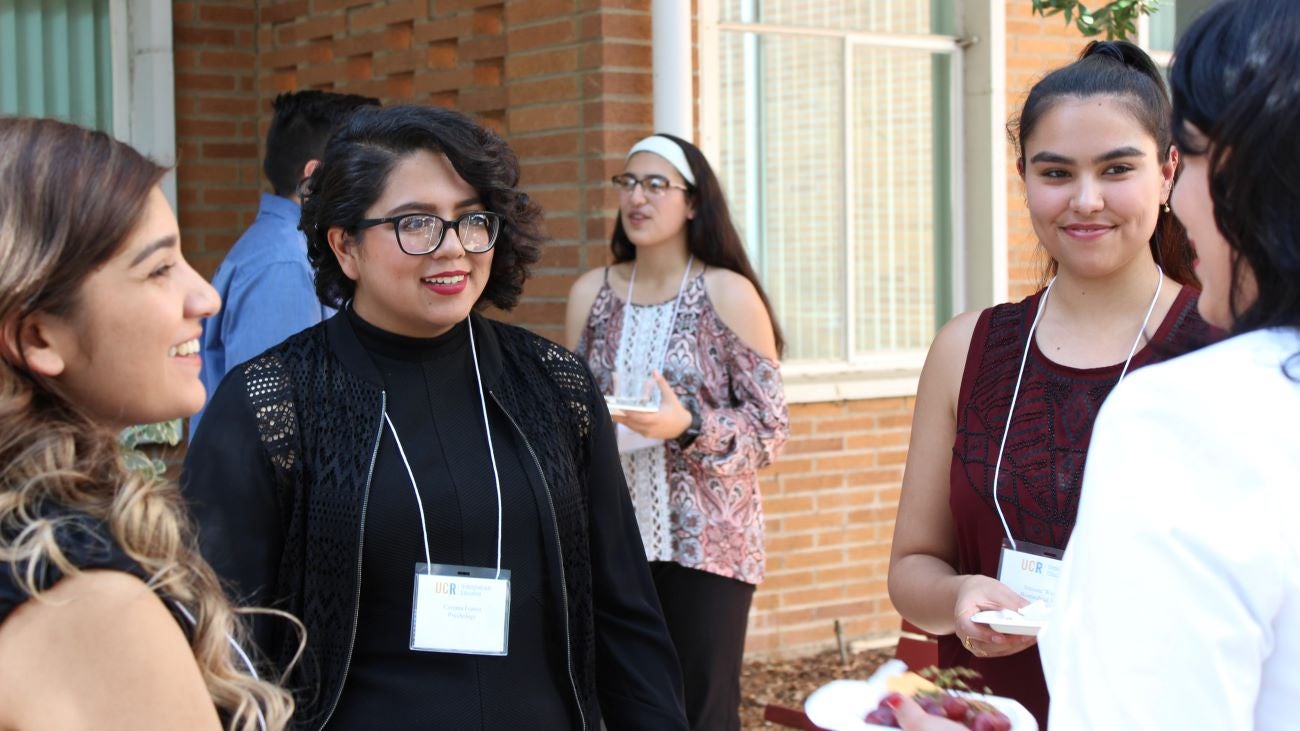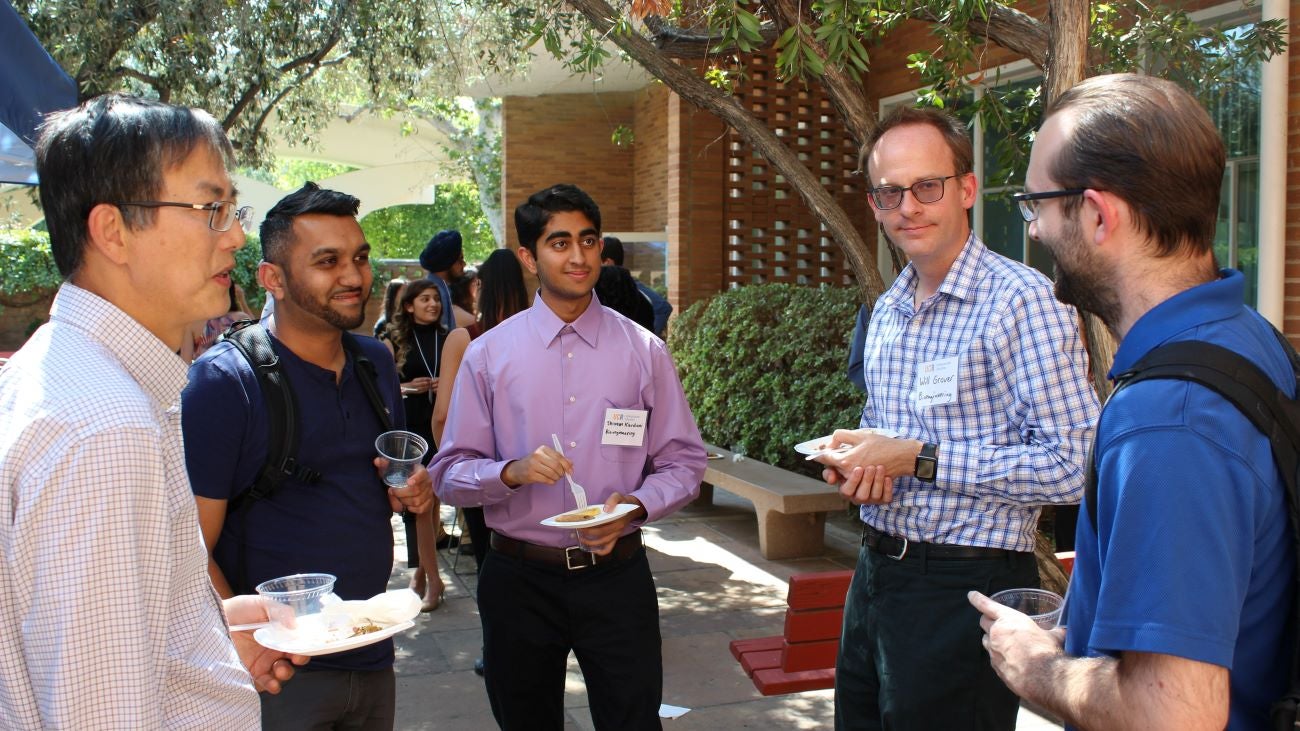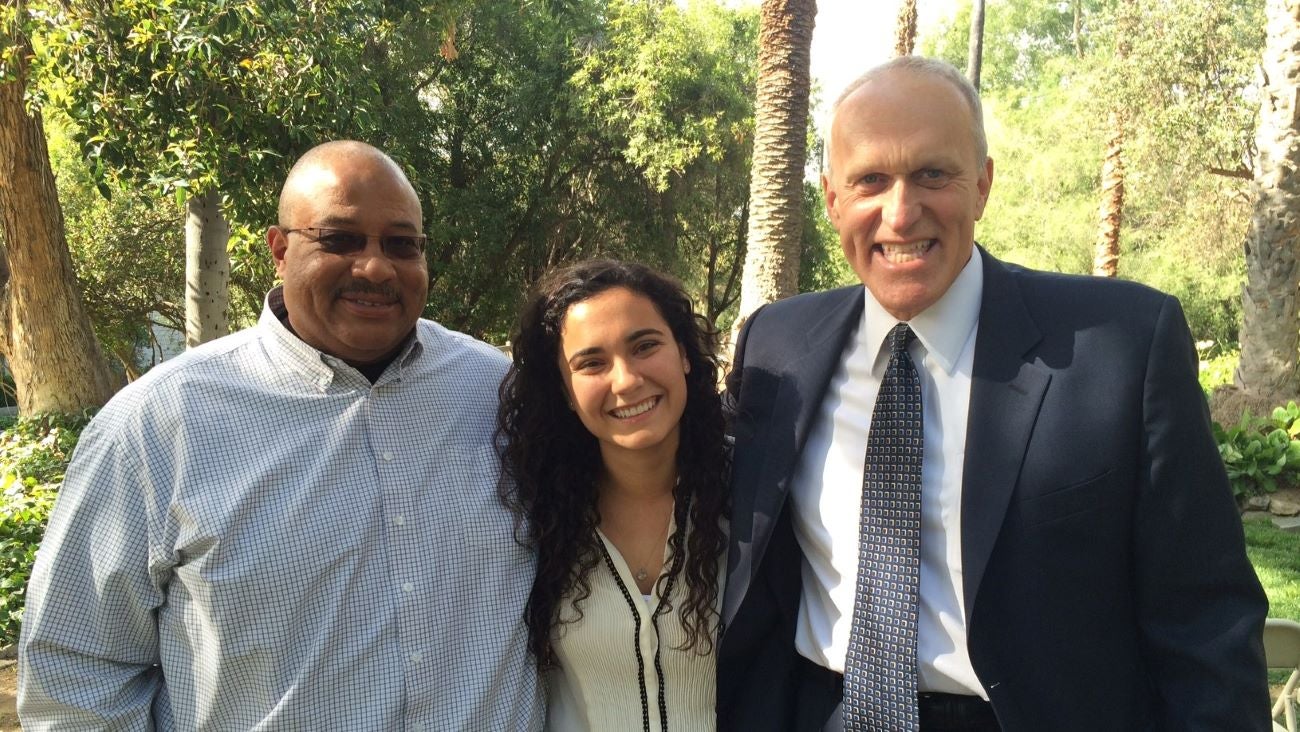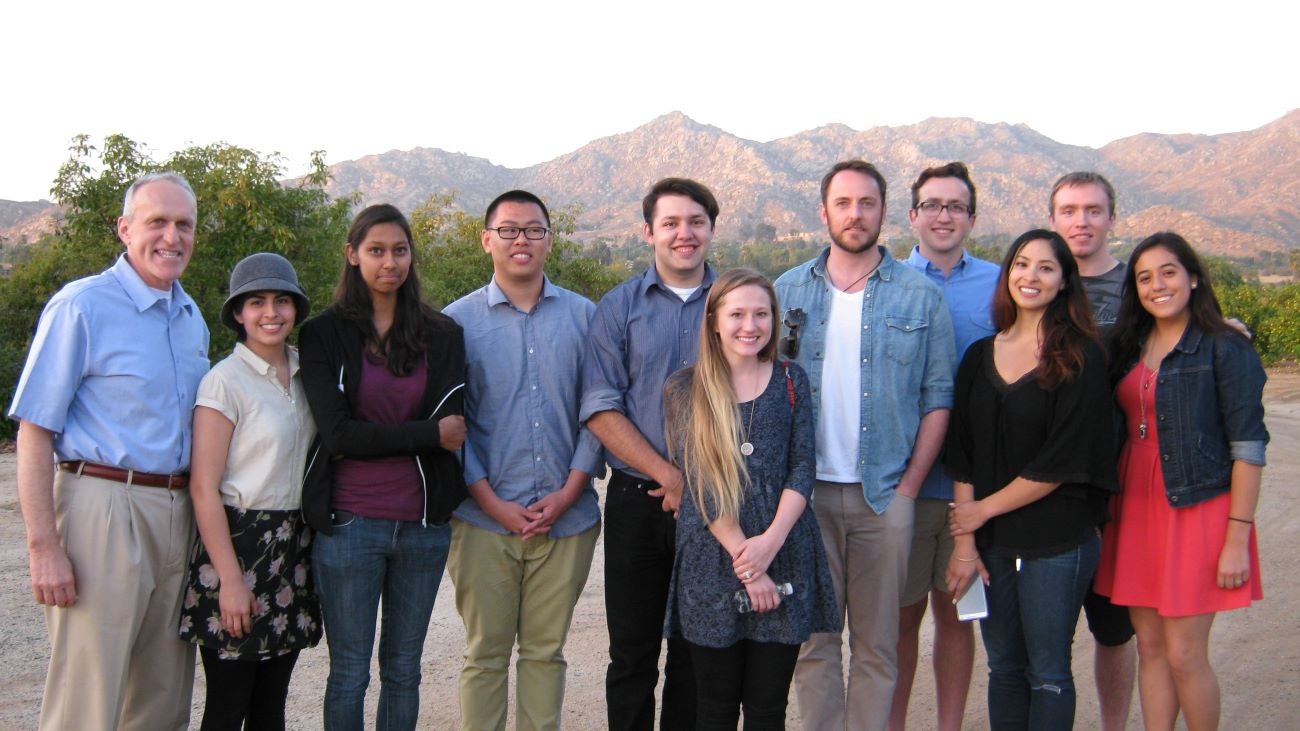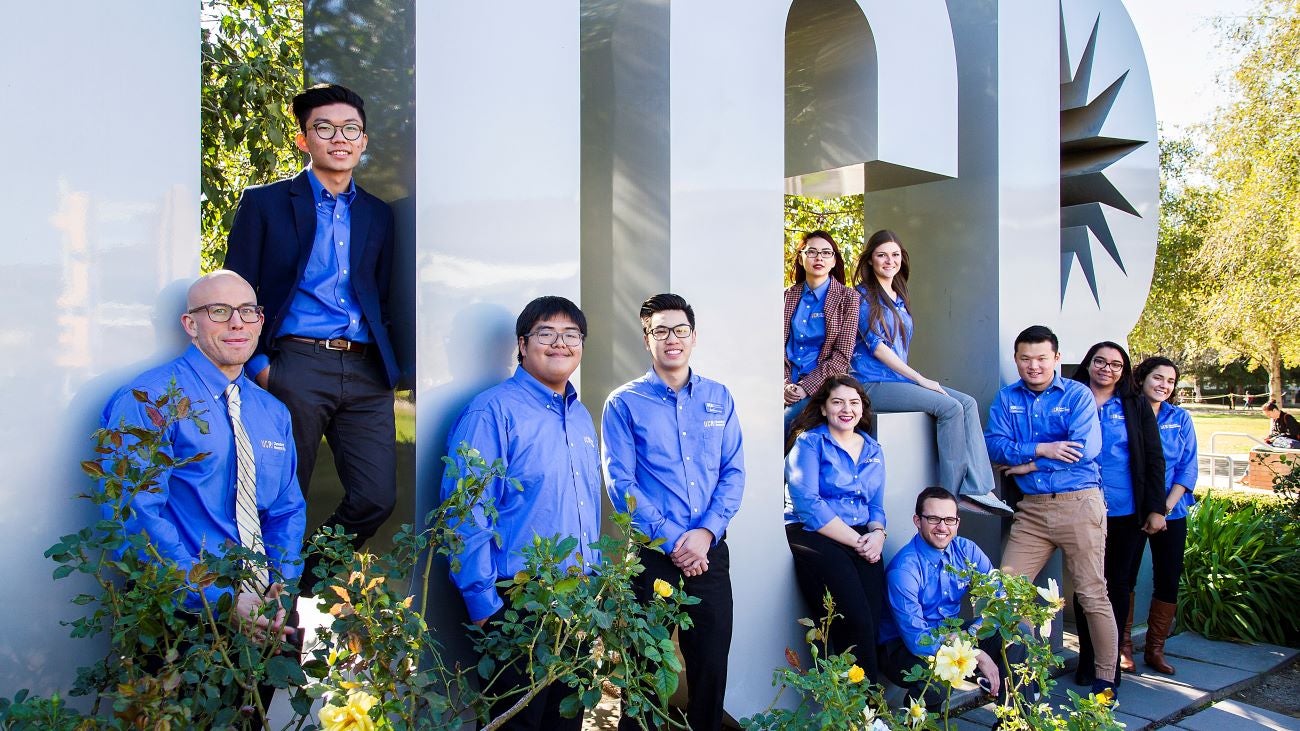Chancellor's Research Fellowship
The UC Riverside Chancellor's Research Fellowship (CRF) is a highly competitive award designed to support undergraduate students engaged in faculty-mentored research and creative activity across all academic disciplines. Established in the 2012/2013 academic year, this prestigious fellowship awards $5,750 to fourteen undergraduate students each year, enabling them to pursue full-time research during the summer.
The CRF offers an enriched academic experience, providing recipients with a unique opportunity to engage with UCR’s Chancellor, university leadership, and distinguished guest speakers. In addition to financial support, fellows benefit from mentorship and professional guidance throughout the year from the Center for Undergraduate Research and Engaged Learning. This fellowship fosters academic growth and career development, empowering students to deepen their research skills and broaden their intellectual horizons.
-
Leadership
Fellows lead the coordination of campus-wide events that address pressing current affairs, while also organizing discussions with influential campus leaders and distinguished visitors, including Phi Beta Kappa Visiting Scholars. This committee provides fellows with invaluable experience in event planning and leadership, while fostering meaningful connections within the academic community.
-
Mentorship
Fellows take on a mentorship role by organizing workshops that guide students in navigating the world of undergraduate research. They help peers establish connections with faculty, build competitive resumes, and navigate the application process for prestigious awards and fellowships. Through these workshops, fellows contribute to the academic and professional growth of their fellow students.
-
Marketing
Fellows drive the promotion and visibility of CRF-related events and initiatives both on and off campus. They use social media platforms to expand the fellowship’s reach and influence, ensuring that the program’s impact extends beyond the university. Additionally, fellows produce and publish a quarterly newsletter to share program highlights, upcoming events, and fellow achievements, further strengthening the CRF community and its presence.
-
Peer Mentorship
Fellows are paired with 2–3 mentees to support their academic and professional growth. CRF Mentors focus on guiding mentees through critical aspects of professional development, including identifying research opportunities, approaching faculty, building a strong résumé, and cultivating essential research skills. Peer Mentors complement this support by helping mentees stay on track with key milestones, ensuring they build a competitive profile to successfully enter the research community.
Through these committees, the fellowship offers a holistic development experience, equipping students with critical skills in leadership, communication, and community engagement.
In addition to their leadership roles, the fellows also spearhead the CRF Peer Mentorship Program, which is designed to provide personalized, one-on-one mentorship to sophomore students, helping them connect with valuable undergraduate research opportunities. Through this program, fellows guide mentees in navigating the process of finding research opportunities, reaching out to faculty, and updating their resumes to align with academic and professional expectations. Fellows also help mentees gain a deeper understanding of what it means to be an undergraduate researcher, including the responsibilities, skills, and opportunities for professional growth that come with research involvement.
The overarching goal of the CRF Peer Mentorship Program is to equip mentees with the tools and knowledge they need to succeed in research, fostering a pipeline of talented students prepared to apply for the Chancellor's Research Fellowship. By building confidence and providing critical resources, the program helps cultivate the next generation of researchers, ensuring a strong foundation for continued academic and professional success.
If you have attended the mandatory CRF Application Workshop and would like to schedule a meeting with a CRF to ask follow-up questions, please fill out our MEETING FORM
CRF Impact Video - Learn About the CRF Experience
CRF Application Deadline
April 6, 2026 @ 5:00 pm
Questions?
ugr@ucr.edu
CRF Peer Mentor Program
Deadline: August 1, 2026
CRF Newsletters
Congratulations to the CRF Cohort. The CRF is a competitive award that supports undergraduate engagement in faculty-mentored research and creative activity projects. Fellows will develop professionally as they engage in leadership, mentorship and service activities. We look forward to a productive year!
Meet the CRFs
Eligibility
-
Grade Standing
Sophomore or junior standing
-
Minimum GPA
Minimum GPA of 3.0
-
Faculty Mentor
Engagement in faculty-mentored research, scholarship, or creative activity is a core requirement of the program. Applicants must submit a detailed research proposal that outlines the project’s objectives, methodology, timeline, and budget. Developing the proposal serves as a valuable opportunity for students to connect with faculty mentors, receive guidance, and begin building a strong foundation for their research journey.
-
Mandatory CRF Application Workshop Attendance
Must attend a CRF Application Workshop. Workshops will be held in winter quarter (weeks 2-8). No exceptions will be made for students who miss attending a workshop. You must attend a workshop in the year that you plan to apply.
Application Requirements
-
Online Application Process
CRF applications will be accepted only via online application process. The application must be written by the student with guidance from his or her faculty mentor. Please note that the online application cannot be saved, thus students should plan to allocate time to complete the application once they have all of the required elements.
-
Faculty Mentor Letter of Recommendation
Faculty Mentor Letter of Recommendation: The letter of recommendation should acknowledge his/her commitment to mentoring the student throughout the proposed project period. Please take note that the faculty mentor will be notified to upload the letter of recommendation only after the online application has been submitted. Applicants should coordinate with the faculty mentor to ensure that the letter of recommendation is uploaded before the deadline.
-
Completed Project Due Date
All research or creative activity projects must be completed by June 30 within the academic year of the fellowship.
-
Project Independence
Although we expect that in many cases the proposed work will relate to the faculty mentor’s current research, CRF applicants must propose a project that is not already financially supported by another program or funding source. It is expected that CRF applicants propose an independent research or creative activity project. If directly related to the research of the faculty mentor, the CRF applicant will need to describe how he/she will be primarily responsible for the undertaking and reporting of the research.
-
Application FAQ
CRF Application FAQ
- I attended a CRF Application workshop last year does that count?
- NO, all applicants must attend a workshop in the academic year they are applying.
- Class standing:
- Students are eligible to apply in so/jr. Accepted students will participate in the following academic year.
- Seniors cannot apply, unless they plan to attend UCR for an entire 5th year. Must plan to be enrolled for the entire year.
- I am graduating in fall or winter of the following year, can I apply?
- NO, CRFs are expected to be enrolled full time during the year they are funded. If you graduate early you will pay back the quarter(s) that you missed.
- I am in or applying to another funded program can I apply to the CRF?
- You can apply, but cannot be funded in both programs.
- If admitted, you will discuss your options with the director.
- Can I apply to be a Senior CRF?
- No, this role is only available to CRFs who have participated in the program in the previous year.
- Can I submit more than one letter of recommendation?
- No, only one letter of recommendation can be submitted, and must be from the faculty overseeing your research project.
- What if I will not be around to conduct research over the summer?
- You are being funded to conduct full-time research over the summer; not meeting this requirement makes you ineligible.
- If I am invited to interview, how can I prepare?
- Know your research and be prepared to answer questions about it.
- Think about how you will contribute to the fellowship.
- What new ideas do you bring?
- How will you help make the CRF be impactful for you and the campus community?
- Can I apply as part of a team?
- No, this fellowship is funding you.
- Can multiple people from my research group apply?
- Yes, but you should consult with your faculty mentor, as only one person from the group can be selected.
- I attended a CRF Application workshop last year does that count?
Proposal must include the following items:
-
Proposal Narrative that outlines the research or creative activity project and includes the following elements
- Abstract (100-word limit): The abstract should be a brief summary of the proposal's key points written in the first person. It should provide information as to: What is being studied? Why is it important to study? How will it be studied?
- Introduction/statement of goals (300-word limit): Say what you are doing—be specific. The reviewer(s) should know what you are proposing to do by the end of this section.
- Creative Project Activity
- Introduce the context and themes to be addressed or improved by the creative activity.
- Describe the rationale for or purpose of the activity and its significance.
- Include a discussion of the relevant context and themes for understanding the creative activity and prior achievements drawn from when designing the specific activity.
- Research Project
- Introduce issues, theories, or problem to be addressed or improved by your research.
- Describe the rationale or purpose of the study/project.
- Include a discussion of relevant literature and/or research that relates to the project, be sure to include full citations in the references section of the proposal.
- Creative Project Activity
- Research Description (700-word limit) Follow Creative Context if this is to be a creative activity or a design project; Follow Research Methodology if this is to be a research project
- Creative Context - Describe the methodology for completing your creative activity project. Describe your approach:
- Identify and describe your approach, theory, literature, or industry practice that informed the process for crafting the creative activity or design project.
- Describe the process that will be followed to create the project. This description should be written clearly and include essential steps.
- Describe the end product of the creative work. Explain how a successful project will be determined.
- Please include references.
- Research Methodology - Describe the research methodology for your project. The methodology should be structured around a research question(s) or hypothesis. The methodology section must include a research question; provide clear research question(s) or hypothesis.
- Describe the data sources and/or data collection procedures for the project. This section should be written very clearly and align to common practices for describing research methodology in the field of study.
- Describe how data will be analyzed. This can range from interpretations of texts to transcribing and coding interviews for common themes to various types of statistical analyses. Be specific and provide clear information.
- Please include references.
- Creative Context - Describe the methodology for completing your creative activity project. Describe your approach:
- Potential Implications (150-word limit): Discuss the potential impact of this project to others in your field.
- Implementation Timeline: Create a timeline of activities related to this project and how it will be undertaken throughout the year. Please include anticipated start date(s) and completion date(s) for all relevant activities (i.e., preparation, project development, analysis, writing reflection, creating presentation materials). The application will provide a form where you will detail your implementation timeline. Please refer to the application presentation video that is provided to students who attend the Mandatory CRF Application Workshop for details on this section. You should summarize your implementation timeline in your proposal to demonstrate your expected progress.
-
Budget and Budget Justification
The CRF Award of $5,750 will be provided for the academic year starting July 1 through June 30. Fellows will receive a $5,000 summer research stipend, and $750 will be disbursed to the faculty member's home department for the following items in priority order: travel to present research outcomes at a national conference; travel to conduct research; materials and supplies; and other expenses required to conduct the research.
You are encouraged to discuss potential research costs with your proposed faculty mentor and department budget analyst before submitting your application. Please note that you will need the contact information of the department budget analyst to complete the application. Ask the faculty who manages their budget. In the budget justification, provide a detailed, itemized explanation of how the requested funds will be allocated. Clearly describe the purpose of each expense and explain its relevance to the successful execution of the proposed activities.
-
References
Fully cite all sources referenced in the project proposal. Please use the citation style that is used in your field of study. Examples would include the American Psychological Association (APA) style, 6th edition, the Chicago Manual of Style, Modern Languages Association, or Council of Biology Editors.
-
Faculty Mentor Letter of Recommendation
A letter of recommendation written by the faculty mentor is mandatory and will be submitted separately from the proposal. This letter should state that he or she approves the proposed project and will provide mentorship throughout the project. The letter should also address:
- The strength of the proposed research or creative activity
- Your (the student/applicant’s) preparedness to undertake the project
- Confirmation that you will work full-time over the summer to earn the stipend
Upon submission of the electronic application form, the Faculty Mentor will receive an email with instructions on how to submit the required letter of recommendation and will also be asked to review your submission. Applicants must coordinate with the letter writer to ensure that they are aware of the submission deadline and will be prepared to upload the letter as soon as the application is submitted.
Review Process and Criteria
-
Faculty Review Committee
CRF applications will be reviewed by an interdisciplinary Faculty Review Committee. In addition to standard review criteria such as clarity, quality, and feasibility of the proposal, applications will be reviewed and evaluated on their strong research design or an innovative creative activity project. Other influential factors include a feasible timeline, a well-developed budget, and a letter of recommendation from your faculty mentor.
-
Selected Fellows Expectations
Selected Fellows will be expected to present their project at UCR’s Annual Symposium for Undergraduate Research, Scholarly and Creative Activity, scheduled in the spring quarter. So be sure to include this as one of your proposed activities.
-
CRF Application Grading Breakdown
CRF Applications will be graded with a maximum score of 100 points. The breakdown is as follows:
- Career Goal Statement, Resume, Elevator Pitch, Abstract - 10pts
- Introduction - 10 pts
- Methodology - 30pts
- Creative Activity: Context/Themes
- Research Project: Methodology/Procedures/Figures
- Potential Implications - 10 pts
- Implementation Timeline - 10pts
- Budget - 10pts
- References - 10 pts
- Faculty Mentor Letter of Recommendation - 10 pts
- Total Maximum Score - 100
-
Research Elevator Pitch Tips
Please make sure to remove passcode on your elevator pitch recording. It is important that you set your recording link to be available to anyone with the link.
Award Notification
Selected Chancellor Research Fellows will be notified via e-mail in May, and will be formally presented to the campus community before the end of the spring quarter.
